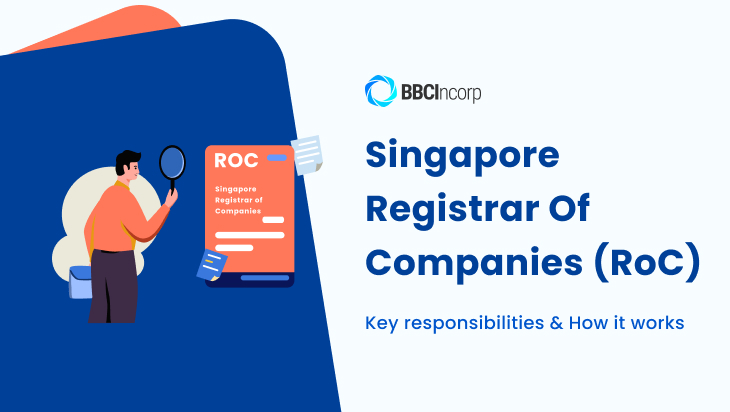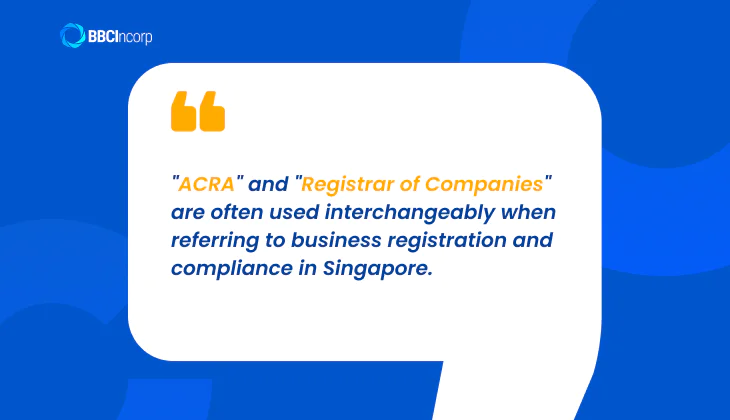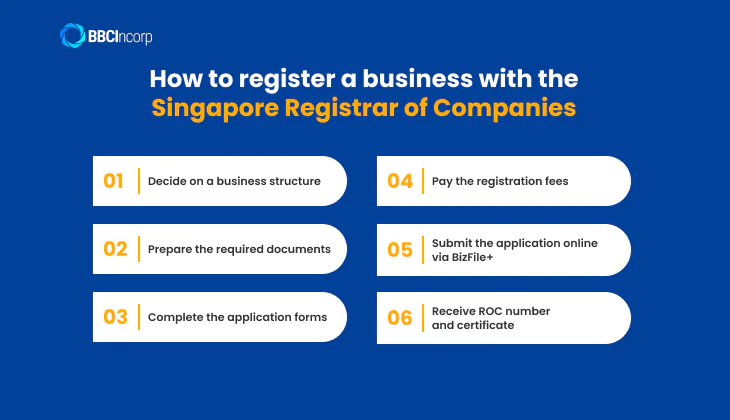
Understanding “what is ROC” is essential for any entrepreneur or company operating in Singapore. The Singapore Registrar of Companies (ROC) serves a pivotal role in the country’s corporate framework, overseeing business registration, monitoring compliance, and ensuring transparency in corporate governance.
In Singapore, the ROC function is administered by ACRA (Accounting and Corporate Regulatory Authority), the national regulator of business entities, public accountants, and corporate service providers.
Through ACRA, the Registrar of Companies maintains an accurate and up-to-date registry, assigns each company a unique ROC number, and provides businesses with access to official records for due diligence or legal requirements.
For companies looking to incorporate or expand operations, familiarity with the Registrar Singapore system ensures smoother registration processes, stronger regulatory alignment, and increased credibility. This guide explores the key responsibilities of the Registrar of Companies and how its systems directly support the ease of doing business in Singapore.
Overview of ROC and ACRA in Singapore
What does ROC mean in Singapore?
The Registrar of Companies Singapore (ROC) is the official government function responsible for supervising company incorporation, maintaining corporate records, and ensuring business compliance.
Unlike some jurisdictions where this role is handled by a distinct registrar, in Singapore, the Registrar of Companies is effectively represented by ACRA—the Accounting and Corporate Regulatory Authority. Therefore, when businesses mention the Singapore Registrar of Companies, they are referring to ACRA acting in its regulatory role over corporate entities.
Understanding ACRA’s background and authority
The Accounting and Corporate Regulatory Authority (ACRA) was established in 2004 through the merger of the Public Accountants’ Board (PAB) and the Registry of Companies and Businesses (RCB). Its creation marked a significant step in consolidating the regulatory framework for businesses and accounting practices in Singapore.
In 2023, ACRA’s authority was further reinforced by integrating the Singapore Accountancy Commission (SAC) and the Accounting Standards Council (ASC). This move expanded ACRA’s role in developing the accountancy sector and overseeing the formulation of national accounting standards.
Due to this consolidated structure, “ACRA” and “Registrar of Companies” are often used interchangeably when referring to business registration and compliance in Singapore.

Core responsibilities of ACRA as ROC
As the registrar Singapore relies on for corporate governance, ACRA carries out a broad range of regulatory and administrative duties:
- Company Registration and Incorporation: Through the BizFile+ portal, ACRA streamlines the process of forming new business entities in Singapore.
- Maintenance of Corporate Records: ACRA keeps a public repository of company data, accessible for transparency and due diligence.
- Ensuring Business Compliance: It monitors companies’ statutory obligations under the Companies Act.
- Enforcement of Corporate Regulations: ACRA has the authority to impose penalties and take legal action against non-compliant entities.
In short, understanding the ROC’s meaning and ACRA’s functions is essential for any entity looking to operate legally and successfully in Singapore.
Business structures registered under ROC
Singapore’s Registrar of Companies (ROC), operated by ACRA, recognizes multiple business structures to suit various operational needs and ownership models. Each structure has distinct legal implications, liability considerations, and compliance obligations.
Below is a comparative summary of key business types registered under the ROC:
| Business Type | Description | Key ROC Requirements |
|---|---|---|
| Sole Proprietorship | Owned by a single individual with unlimited personal liability | Simple registration; owner assumes full legal and financial responsibility |
| Partnership | Includes General, Limited, and Limited Liability Partnership (LLP) formats; liability varies by type | Registration with ACRA; LLPs require a registered manager |
| Private Limited Company | Separate legal entity, preferred for SMEs and startups | At least one local director must appoint a company secretary |
| Public Limited Company | Can offer shares to the public and list on Singapore Exchange (SGX) | Subject to high disclosure, audit, and compliance standards |
| Branch Office / Subsidiary | Set up by foreign companies to operate locally | Requires local representative; compliance with local business laws |
Choosing the correct structure depends on your goals and risk appetite. Learn more about the various types of companies in Singapore to make an informed decision for your business.
How to register a business with the ROC
Registering a business with the Singapore Registrar of Companies (ROC), officially managed by the Accounting and Corporate Regulatory Authority (ACRA), is a streamlined process in Singapore, thanks to its digital infrastructure.
Below is a step-by-step guide for setting up a business in Singapore with the Registry of Companies and Businesses.
Step-by-step registration process

1. Decide on a business structure
The first decision involves selecting the most suitable business structure for your operations. You can choose between a sole proprietorship, a partnership, or a private limited company, each offering different levels of liability protection and compliance requirements.
2. Prepare the required documents
Gather the necessary documents, including proof of identity and residential address for all directors and shareholders, business constitution (for companies), and any applicable business licenses, depending on the nature of your business.
3. Complete the application forms
Carefully fill out the online application on ACRA’s BizFile+ portal. You’ll need to provide the proposed business name, registered address, details of directors, shareholders, and company officers.
4. Pay the registration fees
ACRA charges different registration fees based on the type of entity. Always refer to the latest fee schedule on their website before proceeding with payment.
5. Submit the application online via BizFile+
All applications must be submitted through BizFile+, Singapore’s official digital platform for company registration. The system is user-friendly and ensures efficient processing of your submission.
6. Receive ROC number and certificate
Once your application is approved, you will be issued an ROC number—a unique company registration number used for verification and compliance purposes. Along with it, you’ll also receive an official certificate of incorporation, confirming that your business is legally registered.
Looking to stay compliant post-registration? Discover how a Singapore corporate secretary service can help you fulfill essential regulatory duties.
Key documents and company information needed
To successfully register with the Singapore Registrar of Companies, prepare the following:
- Company Name: Must be distinct and not clash with existing trademarks.
- Business Structure: Indicate whether you’re registering as a sole proprietorship, partnership, or private limited company.
- Director Details: Include full names, identification documents, and contact information of all directors.
- Shareholder Information: State the number of shares and ownership details for each shareholder.
- Registered Address: A physical address in Singapore where all official correspondence will be directed.
- Company Constitution: Outlines governance policies and internal regulations for private limited companies.
- Licenses/Permits: Submit any industry-specific approvals if your business is in a regulated sector.
- Company Secretary: Appointment is mandatory within six months of incorporation to stay compliant with ACRA rules.
Understanding what is ROC and obtaining a valid ROC number ensures your business is recognized and traceable under Singapore law. Whether you’re launching a startup or expanding from abroad, proper registration with the Singapore registry of companies and businesses is the critical first step.
Common services provided by the Registrar
Singapore’s registrar, officially managed through the Singapore Registry of Companies and Businesses, offers a comprehensive suite of services to support corporate governance, compliance, and public transparency.
These services are delivered via the digital platform BizFile+, simplifying interaction with the Registrar of Companies.
| Service | Overview |
|---|---|
| Business Name Registration | Submission and approval of proposed names to ensure uniqueness and compliance with naming rules. |
| Company Incorporation | Incorporate entities such as sole proprietorships, partnerships, LLPs, and private/public companies through BizFile+. |
| Filing of Annual Returns | Mandatory annual returns submission via BizFile+ to keep company information current and comply with the Companies Act. |
| Changes to Company Details | Updates on directors, shareholders, registered address, shares, and company secretary must be filed promptly. |
| Striking Off or Closing a Business | Authorised officers can apply to strike off inactive companies online; the process includes public notifications and takes several months. |
| Public Document Access via BizFile+ | Purchase or retrieve official documents such as business profiles, annual returns, constitutions, and compliance certificates. |
These services enhance corporate transparency and bolster investor confidence by maintaining publicly accessible, real-time company data. Companies stay accountable through mandatory filings and regulatory oversight, while stakeholders can perform due diligence using authenticated documents.
In addition, the digital-first infrastructure of BizFile+ ensures timely filings and reduces procedural friction.
By centralising key business functions—such as incorporation, ongoing updates, statutory filings, and closure—the Registrar of Companies in Singapore strengthens regulatory reliability and supports ease of doing business.
ROC compliance essentials for businesses
Once your business is registered with the Singapore Registrar of Companies (ROC), you must fulfill several legal obligations to maintain good standing under ACRA’s regulatory framework.
Common compliance requirements
- Annual Filing Obligations
Every company must file an Annual Return within 30 days of its Annual General Meeting (AGM), and hold the AGM within prescribed timeframes—typically within 6 months after the financial year‑end (first AGM within 18 months of incorporation, subsequently no more than 15 months apart).
- Registered Office & Company Secretary
You must maintain a registered office in Singapore and appoint a company secretary within six months of incorporation. The secretary cannot be the sole director if only one director is appointed.
This role is critical to filing returns, maintaining statutory registers, and ensuring compliance. For professional assistance, check out our guideline for company secretary in Singapore.
- Accurate Record-Keeping
Companies must keep proper accounting records, corporate registers, and updated company details—such as changes in directors, shareholders, or registered address—and submit these to ACRA promptly (typically within 14 days of a change).
Penalties and enforcement by the ROC
- Late Filing Penalties & Fines
Non-compliance with AGM or Annual Return deadlines incurs fixed composition sums—typically SGD 300 per breach—and can escalate to fines up to SGD 5,000 per offence or summons for prosecution if not settled.
- Director Disqualification and Debarment
Directors convicted of three or more filing offences within five years may be disqualified from serving on boards for five years. Prolonged non-compliance (three continuous months) can lead to debarment, barring individuals from serving as directors or secretaries of any company.
- Striking Off & ROC Number Importance
Persistent failure to meet obligations can result in the company being struck off. Maintaining a valid ROC number and company in good standing is essential for legal operation and reputation in Singapore’s regulatory ecosystem.
How BBCIncorp supports your company registration in Singapore
Starting a business in Singapore means navigating the procedures set by the Singapore Registrar of Companies (ROC) and complying with ACRA regulations. BBCIncorp provides end-to-end support to help both local and foreign entrepreneurs register a company in Singapore quickly, efficiently, and in full compliance.
- Complete Company incorporation services
BBCIncorp manages the entire incorporation process— from securing name approval to preparing and submitting required documents to ACRA. Whether you’re a local resident or a foreign investor, the team ensures your company is set up smoothly and in accordance with ROC Singapore requirements.
- Tailored Packages for Locals and Foreigners
For Singapore citizens and permanent residents, BBCIncorp offers fast-track registration packages that streamline the setup process.
For foreigners and non-residents, BBCIncorp provides specialized services, including nominee director support, to meet statutory compliance and facilitate remote registration.
Opening a business bank account can be challenging, especially for foreign owners. BBCIncorp assists in document preparation and connects you with reputable banking partners, ensuring a seamless experience.
- Ongoing Compliance: Accounting, auditing & tax filing
To maintain good standing with the Singapore registry of companies and businesses and IRAS, BBCIncorp offers expert accounting, auditing & tax filing in Singapore. Services include bookkeeping, tax submission, and audit preparation—helping your business remain compliant year-round.
- Legal and Operational Support
BBCIncorp also provides professional company secretary services, fulfilling a key legal requirement. For businesses hiring foreign professionals, immigration support is available for Employment Pass and EntrePass applications.
- Digital Business & Payment Solutions
Entrepreneurs in the e-commerce space can benefit from consulting on merchant account setups with Stripe, PayPal, and other platforms. Additionally, BBCIncorp offers tailored compliance support to help online businesses grow legally and sustainably.
With BBCIncorp, company incorporation in Singapore becomes a guided, reliable process, giving you the confidence to launch and grow your business in one of Asia’s most business-friendly environments.
Conclusion
Understanding the functions and structure of the Singapore Registrar of Companies (ROC) is essential for any business operating or planning to operate in the country. The ROC ensures transparency, legal compliance, and streamlined governance through its regulatory framework. For businesses, staying aligned with the requirements of the Registrar of Companies not only builds credibility but also safeguards against legal and financial risks.
Navigating ROC Singapore obligations may seem complex, especially for foreign entrepreneurs. That’s where experienced corporate service providers like BBCIncorp come in. With tailored support for incorporation, compliance, and reporting, BBCIncorp simplifies the entire process, making it efficient, accurate, and worry-free.
Whether you’re a startup or an expanding international firm, partnering with a reliable service provider allows you to focus on growth, knowing your statutory duties are handled with precision. In short, ROC compliance isn’t just a legal necessity; it’s a strategic advantage. For personalized support, reach out to our team at service@bbcincorp.com.
Frequently Asked Questions
Can I process corporate services online in Singapore?
Yes. Through Bizfile+ Singapore, you can submit company registrations, update business details, file annual returns, and request public documents—all digitally via ACRA’s portal, eliminating in‑person visits to the Registrar of Companies Singapore.
Is ROC number the same as UEN (Unique Entity Number)?
No. The ROC number refers to the identifier issued by the Registrar of Companies, i.e. ACRA. The UEN is the standard business registration number assigned to companies and other entities in Singapore. While all companies must register with the Singapore Registry of Companies and businesses, the ROC number itself and the UEN serve different purposes.
Can foreign companies get an ROC number?
Foreign companies setting up in Singapore, such as branch offices, can obtain a UEN upon registration with ACRA. However, a standalone ROC number is not issued separately. Once registered, these entities must comply with the same governance obligations as local companies under the Registrar of Companies regime.
Where can I access ROC documents?
You can retrieve public documents—such as business profiles, annual returns, and certificate of incorporation—via ACRA’s BizFile+ portal. These documents are accessible to the public for transparency and due diligence, and can be purchased directly through the portal.
Disclaimer: While BBCIncorp strives to make the information on this website as timely and accurate as possible, the information itself is for reference purposes only. You should not substitute the information provided in this article for competent legal advice. Feel free to contact BBCIncorp’s customer services for advice on your specific cases.
Industry News & Insights
Get helpful tips and info from our newsletter!
Stay in the know and be empowered with our strategic how-tos, resources, and guidelines.





